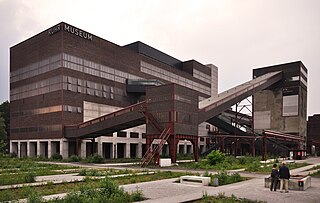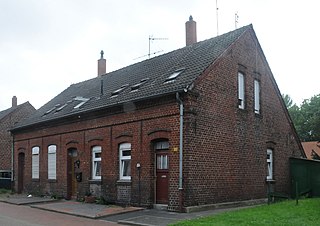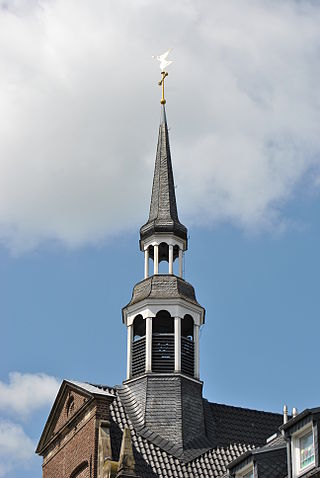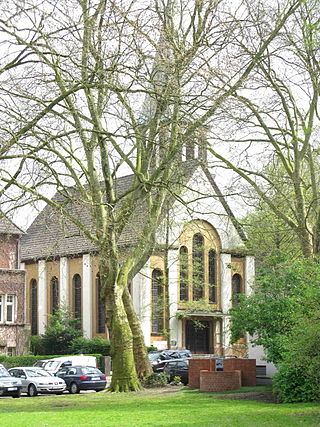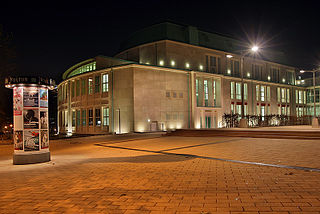82 Sights in Essen, Germany (with Map and Images)
Legend
Welcome to your journey through the most beautiful sights in Essen, Germany! Whether you want to discover the city's historical treasures or experience its modern highlights, you'll find everything your heart desires here. Be inspired by our selection and plan your unforgettable adventure in Essen. Dive into the diversity of this fascinating city and discover everything it has to offer.
Sightseeing Tours in Essen1. Die unendliche Geschichte
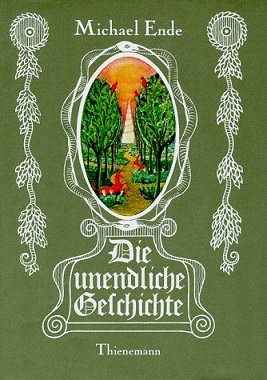
The Neverending Story is a fantasy novel by German writer Michael Ende, published in 1979. The first English translation, by Ralph Manheim, was published in 1983. It was later adapted into a film series.
2. Gruft Vietinghoff-Schell
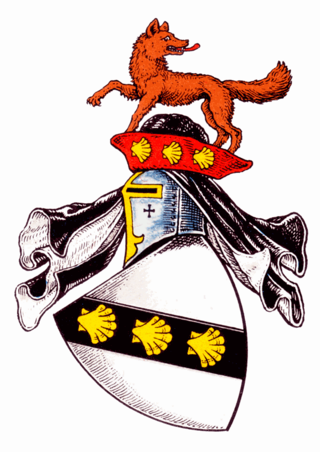
Vietinghoff is the name of a Westphalian noble family of the County of Mark with the former ancestral house of Vittinghoff Castle near Essen-Rellinghausen, which also branched out into the Baltic States in the Middle Ages.
3. Walter-Hohmann-Sternwarte
The Walter Hohmann Observatory in the Schuir district of Essen is a public observatory operated by a non-profit association that also participates in planetoid research. It was named in memory of the space pioneer Walter Hohmann. The observatory is located at 120 m above sea level.
4. Burg Altendorf
The ruins of Altendorf Castle stand on a peninsula south of the Ruhr in the Essen district of Burgaltendorf at an altitude of 100 meters above sea level. It is a lowland castle with a moat, which was demonstrably never used as a moat, and has the largest surviving residential tower – also known as a donjon – between the Rhine and Weser.
5. Schloss Borbeck
Borbeck Castle is a baroque moated castle in the Borbeck district of Essen, Germany. Since the 14th century, it has been the preferred residence of the Essen abbesses and received its present external appearance in the 18th century. Since the 1980s, it has been used as a venue for further education and cultural events.
6. Zollverein Coal Mine Industrial Complex
The Zollverein Coal Mine Industrial Complex is a large former industrial site in the city of Essen, North Rhine-Westphalia, Germany. The first coal mine on the premises was founded in 1847, and mining activities took place from 1851 until December 23, 1986. For decades, starting in the late 1950s, the two parts of the site, Zollverein Coal Mine and Zollverein Coking Plant, ranked among the largest of their kinds in Europe. Shaft 12, built in the New Objectivity style, was opened in 1932 and is considered an architectural and technical masterpiece, earning it a reputation as the "most beautiful coal mine in the world".
Wikipedia: Zollverein Coal Mine Industrial Complex (EN), Website, Heritage Website
7. Friedenskirche
The Church of Peace is located on Bernestraße near the Old Synagogue and the Town Hall in the centre of Essen. The Old Catholic church, which is a listed building, was built between 1914 and 1916. The origin in the midst of the horrors of the First World War makes the naming easy to understand.
8. Erlöserkirche
The Evangelical Church of the Redeemer in Essen's southern quarter is a neo-Romanesque church building that has been a listed building since 1986. It belongs to the Church of the Redeemer in Holsterhausen in the Essen church district of the Evangelical Church in the Rhineland and offers space not only for congregational services, but also for cultural events, especially for concerts by the Essen Bach Choir and the choir "Gospel and more".
9. Museum Folkwang
Museum Folkwang is a major collection of 19th- and 20th-century art in Essen, Germany. The museum was established in 1922 by merging the Essener Kunstmuseum, which was founded in 1906, and the private Folkwang Museum of the collector and patron Karl Ernst Osthaus in Hagen, founded in 1902.
10. Auferstehungskirche
The Church of the Resurrection in Essen is a Protestant church building from 1929. It belongs to the municipality of Altstadt in the church district of Essen of the Evangelical Church in the Rhineland. The round church is located in the Südostviertel district and is considered a leading building of modern church architecture in Europe.
Wikipedia: Auferstehungskirche (Essen) (DE), Website, Heritage Website
11. Kreuzeskirche
The Kreuzeskirche on Weberplatz in Essen's city centre is a Protestant church that was built between 1894 and 1896 according to plans by the architect August Orth. After severe damage in the Second World War, it was rebuilt by 1953 and is now a listed building. It belongs to the municipality of Altstadt in the church district of Essen of the Evangelical Church in the Rhineland.
Wikipedia: Kreuzeskirche (Essen) (DE), Website, Heritage Website
12. Viktoria-Gymnasium
The Viktoria-Gymnasium was a general education grammar school near the city centre of Essen in the Südostviertel district. The school building on Kurfürstenplatz, which was inaugurated in 1914, and the director's residence are now on the list of monuments of the city of Essen.
13. Domkirche Ss. Cosmas und Damian
Essen Minster, since 1958 also Essen Cathedral is the seat of the Roman Catholic Bishop of Essen, the "Diocese of the Ruhr", founded in 1958. The church, dedicated to Saints Cosmas and Damian and the Blessed Virgin Mary, stands on the Burgplatz in the centre of the city of Essen, Germany.
14. Altenhof II
The Altenhof estate consists of the two construction phases of the Altenhof I estate, which was built between 1893 and 1907, and the Altenhof II estate from the years 1907 to 1914. Both were built by Friedrich Krupp AG for their former employees. At that time, it was a revolutionary social commitment that the elderly, invalids and single people were allowed to live here rent-free. Today, the remaining parts of the Altenhof settlement are a testimony to historical settlement development and thus belong to the Route of Industrial Culture.
15. Schloß Schellenberg
Schloss Schellenberg is a well-preserved castle on a wooded hill in the Ruhr Heights in the Essen district of Rellinghausen, North Rhine-Westphalia. From 1452 to 1993 it was the property of the Barons von Vittinghoff called Schell zu Schellenberg and until 1909 their residence.
16. St. Ludgerus
The St. Ludgerus Church in Essen-Werden is considered one of the most important late Romanesque church buildings in the Rhineland. It was built at the beginning of the 9th century as the abbey church of the Benedictine monastery of Werden and was redesigned in the 13th century in the Rhenish transitional style. Outside the actual church building is the crypt with the shrine of St. Ludgerus. Since the abbey was abolished, St. Ludgerus' Basilica has been a Catholic parish church. Since 1993, it has held the title of a basilica minor.
17. Evangelische Kirche Heckstraße
The Evangelical Church Essen-Werden is a church in the Essen district of Werden. It belongs to the parish of Werden in the church district of Essen of the Evangelical Church in the Rhineland. A special feature of the church is the interior design with rich floral elements, which is unusual for a Protestant place of worship.
18. Eisenbahnmuseum Bochum-Dahlhausen
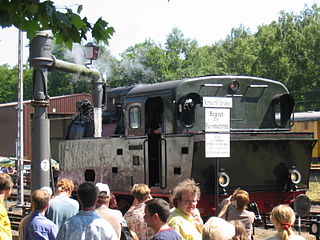
The Eisenbahnmuseum Bochum-Dahlhausen is a railway museum situated south of the city of Bochum in the state of North Rhine-Westphalia, Germany. It was founded by DGEG, the German Railway History Company in 1977 and is based in a locomotive depot that was built between 1916 and 1918 and ceased operation in 1969. Then DGEG took over the whole area of 46,000 square metres and built up the biggest railway museum in Germany. In the middle of the museum, there is an engine shed with fourteen tracks. A preserved turntable, coaling, watering, and sanding facilities are still in operation. This museum is integrated into The Industrial Heritage Trail a route of monuments from the history of the industry.
19. Villa Hügel
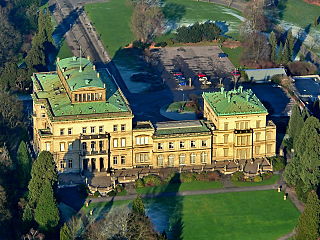
The Villa Hügel is a 19th-century mansion in Bredeney, now part of Essen, Germany. It was built by the industrialist Alfred Krupp in 1870–1873 as his main residence and was the home of the Krupp family until after World War II. More recently, the Villa Hügel has housed the offices of the Kulturstiftung Ruhr, an art gallery, the historical archive of the Krupp family and company, and a concert venue.
20. Südwestfriedhof
The municipal Essen Southwest Cemetery is located in the west of the city of Essen in the district of Fulerum. It is the second largest burial site in the city in terms of area after the park cemetery. 2878 victims of both world wars are also buried here.
Wikipedia: Südwestfriedhof Essen (DE), Website, Heritage Website
21. Dubois-Arena
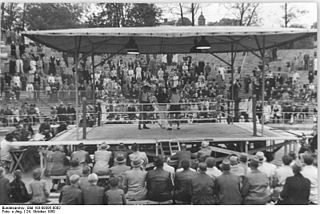
In the 1950s, the Dubois Arena was a boxing venue in the Borbeck district of Essen. Today it is used for cultural open-air events. The arena bears the name of the founder and first president of the Federation of German Professional Boxers (BDB), Ernst Dubois (1900–1957).
22. Wasserturm am Steeler Berg
The water tower on Steeler Berg is located on Diether-Krebs-Platz in the southeastern quarter of the city of Essen. In 1985 it was included in the list of monuments of the city of Essen. It still has its function as a water tower today. It is also the headquarters of the Essener Tafel today.
Wikipedia: Wasserturm am Steeler Berg (DE), Heritage Website
23. Steeler Wasserturm
The Essen-Steele water tower at Laurentiusweg 83 in the Essen district of Steele was built in 1898 on the highest geographical point in Steele and drew its water from the Steeler waterworks on Westfalenstraße directly on the Ruhr.
24. Marktkirche
Essen's Market Church, known as the Gertrudis Church until the end of the 19th century, is located in Essen's city centre on the market, the original Essen market square, which was once the economic, political and religious centre of the city. The originally Romanesque hall church, which was late Gothic after partial reconstruction, was the first Protestant church in Essen.
25. Deutschlandhaus
Today, the Deutschlandhaus is an office and commercial building in Essen's city centre on Lindenallee. It was built in 1928 and 1929 as a technical town hall and is considered the first high-rise building in the city. It has been a listed building since 1988.
Wikipedia: Deutschlandhaus (Essen) (DE), Website, Heritage Website
26. Linuxhotel
The Villa Vogelsang is a villa on the Ruhr heights in the Essen district of Horst on Antonienallee. The name goes back to one of the previous owners, the entrepreneur Wilhelm Vogelsang. On the park-like property there is also a former coach house in the immediate vicinity of the villa. The villa and coach house are listed as historical monuments and are part of the Route of Industrial Heritage.
27. Alte Synagoge
The Old Synagogue is a former Reform Jewish congregation and synagogue, located at Steeler Straße 29, in Essen, in the state of North Rhine-Westphalia, Germany. The former synagogue was repurposed in 1960 as a Jewish museum.
Wikipedia: Old Synagogue (Essen) (EN), Website, Heritage Website
28. Ruhrkämpfermahnmal
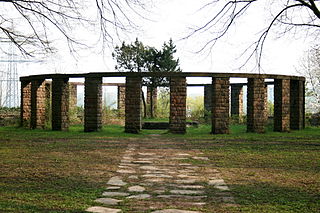
The Ruhr Fighters' Memorial is a monument erected in 1934 during the National Socialist era in the Essen district of Horst. It is located in a wooded area directly above the north bank of the Ruhr about 100 meters southeast of Haus Horst. In 1985 it was rededicated to a memorial.
29. Stadtgarten Essen
The Stadtgarten Essen is Essen's oldest publicly accessible green space. It is located south of Essen's main train station in the Südviertel district, between the Aalto Theatre, the Philharmonic Hall and the adjacent Rüttenscheid district.
30. St. Mariä Geburt
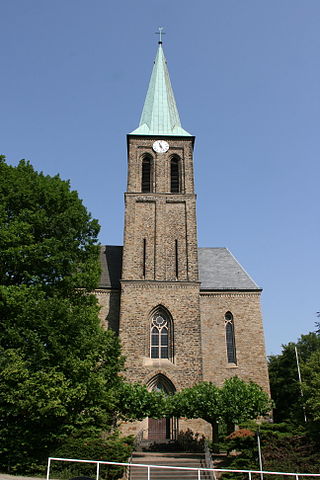
Sankt Mariä Geburt is a Roman Catholic church building in the Kupferdreh district of Essen, Germany, which has been listed since 1989. It was built in the neo-Gothic style from 1876 to 1879 from light brown Ruhr sandstone. The reason for the construction of the church was the sharp increase in the number of believers in Dilldorf. The church stands on Dilldorfer Straße and is dedicated to Mary, the mother of Jesus.
Wikipedia: St. Mariä Geburt (Kupferdreh-Dilldorf) (DE), Heritage Website
31. Vryburg
The Vryburg is a medieval ring wall that is important for the early medieval settlement in the Ruhr Valley. Today's desertification of the complex is located in the eastern Essen district of Horst on a hill north of the Ruhr in the immediate vicinity east of Haus Horst. It may have been the forerunner of this manor house. However, the assumption has not yet been proven.
32. St. Antonius (Frohnhausen)
Today's parish church of St. Antonius stands in the centre of the western Essen district of Frohnhausen. It was designed by the architect Rudolf Schwarz and consecrated in 1959. It has been a listed building since 1985. The patron saint of the parish and parish is St. Anthony of Padua, patron saint on 13 June.
Wikipedia: St. Antonius (Essen-Frohnhausen) (DE), Website, Url, Website, Heritage Website
33. Geschossdreherei
The Krupp steelworks, or Krupp foundry, or Krupp cast steel factory in Essen is a historic industrial site of the Ruhr area of North Rhine-Westphalia in western Germany that was known as the "weapons forge of the German Reich".
34. Rathaus Kray
The Kray town hall was the seat of the mayor and the administration of the Kray-Leithe mayor's office, which was founded in 1906. The representative building was completed in 1908. It lost its function in 1929 when the city of Kray was incorporated into the city of Essen. Today, among other things, branch offices of the Essen city administration are housed here.
35. Der große Geist
In the Grugapark of the city of Essen, 44 sculptures and works of art are currently on display in the open area. They range from classical modernism to contemporary art and can be visited on guided tours, among other things. Most of them are mainly permanent loans from private individuals, companies, foundations, museums or artists whose works are presented in the protected area. This makes it the largest sculpture park in the Ruhr area. The Grugapark Collection also includes three works of art that are located outside the park in the Moltkeplatz sculpture ensemble and come from the donation of Roger Schimanski.
36. Krupp Stammhaus
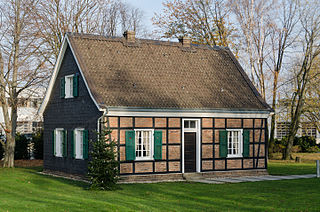
The original house of Krupp was initially a slate half-timbered building built as an overseer's house in 1818/1819, and later the residence of the Essen industrialist family Krupp. After being destroyed in the war, it was reconstructed true to the original in 1961.
37. Alteburg
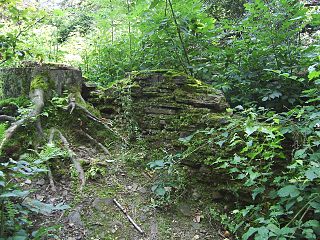
The Alteburg is the largest and oldest castle complex in Essen, a Carolingian ring wall in the Essen district of Heidhausen on the left bank of the Ruhr in North Rhine-Westphalia. A few hundred metres further north on the Pastoratsberg there was a similar complex in the 9th to 11th centuries, the Herrenburg.
38. Korteklippe
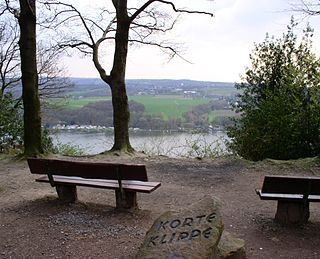
The Korte Cliff is a vantage point on Lake Baldeney. It is located in the Schellenberger Forest near the Essen district of Heisingen. It is named after the Essen horticultural director Rudolf Korte (1878–1950).
39. Halbachhammer
The Halbachhammer in the Essen district of Fulerum is the remnant of the medieval Fickynhütte from Weidenau an der Sieg. Gustav Krupp von Bohlen und Halbach had it transferred to the Nachtigallental within sight of the Margarethenhöhe and donated it to the city. Today, the Halbachhammer is a technical and economic historical monument, a branch of the Ruhr Museum and part of the Route of Industrial Culture.
40. ChorForum
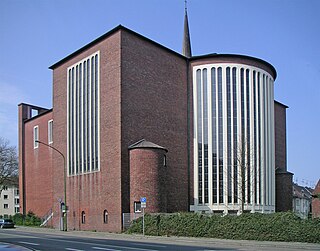
The church of St. Engelbert is in the south district of the city of Essen. It was designed by the architect Dominikus Böhm and consecrated in 1935. In 1993 they were listed under monument protection. She was profaned in 2008.
41. Bramme für das Ruhrgebiet
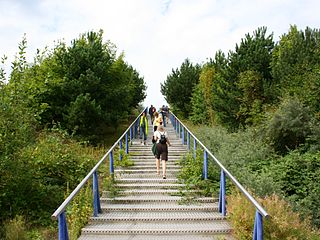
The Schurenbach slag heap is an approximately 50-metre-high slag heap of hard coal mining in the Essen district of Altenessen. The slag heap is named "Schurenbach" after the body of water buried under it from the 1970s onwards and is located directly on the Rhine-Herne Canal, between Emscherstraße and Nordsternstraße and near the Nordsternpark Gelsenkirchen.
42. Grugahalle
The Grugahalle is a multi-purpose indoor arena located at the edge of the Botanischer Garten Grugapark in Essen, Germany. Opened on 25 October 1958, its seating capacity is about 7,700 people and about 10,000 for unseated events. The building was heritage-listed in 2000.
43. Aalto-Theater
The Aalto Theatre is a performing arts venue in Essen, Germany, and is home to the city's opera company Aalto-Musiktheater and the ballet company Aalto Ballett. The Essener Philharmoniker serve as the venue's orchestra. The theatre opened on 25 September 1988 with Richard Wagner's opera Die Meistersinger von Nürnberg and is mainly used for opera and ballet, but also for concerts and galas.
44. Philharmonie/ Saalbau
Saalbau Essen is a concert venue in Essen, Germany, the home of the Essen Philharmonic. The original building was completed in 1902, and destroyed during World War II on 26 July 1943. It was rebuilt between 1949 and 1954 and completely renovated in 2003 and 2004. The Saalbau Essen is located a little bit south of the city center close to the Aalto Theatre. Since the 2013/2014 season Tomáš Netopil has been the music director of Essener Philharmonic. Also since 2013/2014 Hein Mulders has been the intendant of the Saalbau Essen.
45. Christuskirche Altendorf
The Christuskirche in Essen belongs to the Evangelical Lutheran parish of Essen-Altendorf in the Essen church district of the Evangelical Church in the Rhineland and is located in the Essen district of Altendorf in the west of the city on Kopernikusstraße.
46. Amtsgericht Steele
The Essen-Steele District Court, located in the Essen district of Steele, is responsible for the districts of Burgaltendorf, Byfang, Freisenbruch, Horst, Kray, Kupferdreh, Leithe, Steele, Überruhr-Hinsel and Überruhr-Holthausen.
47. Kaiser-Wilhelm-Park
Kaiser-Wilhelm-Park is a ten-hectare park in the Altenessen-Süd district of Essen. It was opened in 1897 on the 100th birthday of Kaiser Wilhelm I and named after him. In the course of workers' welfare, it was created expressly for the recreation of the residents of the heavily industrial district.
48. Grugaturm
The Grugaturm is a 29-metre-high observation tower in the Grugapark in the Rüttenscheid district of Essen and an architectural monument of classical modernism. The logo of the park is placed on top of the tower in the form of a stylized tulip.
49. Baedeker-Haus
The Baedeker House was built in 1927 and 1928 on Kettwiger Straße in the centre of Essen as a commercial building for the G. D. Baedeker publishing house. It was placed under monument protection in 1987.
50. Trip Inn
The Osram House is a commercial building built in 1928/1929 in Essen's southern quarter, which has been a listed building since 1987. It was built according to plans by the Essen architect Ernst Knoblauch. After renovation, the house has been a hotel since July 2020.
Wikipedia: Osram-Haus (Essen) (DE), Website, Heritage Website
51. Gerhard Meyer-Schwickerath
Gerhard Rudolph Edmund Meyer-Schwickerath was a German ophthalmologist, university lecturer and researcher. He is known as the father of light coagulation which was the predecessor to many eye surgeries.
52. Friedenskirche Steele
The Protestant Church of Peace in the eastern Essen district of Steele is a neo-Gothic, three-aisled church building that has been a listed building since 1989. The church was built in 1872 according to plans by the Essen architect Julius Flügge as a successor to a predecessor church that had become too small on the same ground and is today the parish church of the Protestant parish of Königssteele, which belongs to the Essen church district of the Evangelical Church in the Rhineland.
Wikipedia: Friedenskirche (Essen-Steele) (DE), Website, Heritage Website
53. Krupp-Park
Krupp Park is a park in the western quarter of the city of Essen. It was laid out from 2009 to 2024 as an integral part of the Krupp-Gürtel urban development project and is located in a north-south extension parallel west of Berthold-Beitz-Boulevard. In the southern part of the park there is a sports facility.
54. Stratmanns Theater
The Amerikahaus Ruhr, called Europahaus since 1994, is a listed building in the center of Essen since 1991. It was built by the Americans in the early 1950s as the America House and the first main base of their information network in selected major cities. After the house later served as the seat of the Lord Mayor for 15 years, it has been home to the cabaret stage Stratmanns Theater since 1994.
55. Gervinuspark
Gervinuspark is a park in the Frohnhausen district of Essen, Germany. Until 1959, this area was used as the West Cemetery of the city of Essen. The tomb of the first and only mayor of the mayor's office of Altendorf, the largest rural community in Prussia at the time, Wilhelm Kerckhoff, is still present today.
56. St. Barbara (Byfang)
The Church of St. Barbara is a Roman Catholic church building in the Byfang district of Essen, Germany. The church, named after St. Barbara of Nicomedia, patroness of miners, belongs to the parish of St. Josef Essen Ruhrhalbinsel in the city deanery of Essen of the diocese of Essen. The church stands in a slightly elevated position on the Nöckersberger Sattel.
57. Gnadenkirche Dellwig
The Evangelical Church of Grace in Essen-Dellwig belongs to the congregation of Dellwig-Frintrop-Gerschede in the church district of Essen of the Evangelical Church in the Rhineland. It was inaugurated in 1894, expanded in 1929 and rebuilt after damage in the Second World War. The church has been a listed building since 1994.
Wikipedia: Gnadenkirche (Essen-Dellwig) (DE), Website, Heritage Website
58. Jugendhalle Schonnebeck
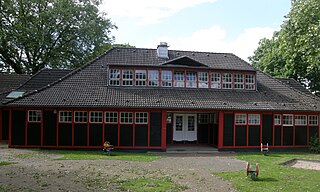
The Schonnebeck Youth Hall is a gymnasium and festival hall in the Schonnebeck district of Essen, which was first used as an exhibition building in Cologne in 1914, then reused in Essen and is now a listed building.
59. Marktkirche Kettwig
The Evangelische Marktkirche is a listed church building in Kettwig, a district of Essen. It belongs to the parish of Kettwig in the church district of Essen of the Evangelical Church in the Rhineland. The name Kirche am Markt has prevailed because it enables a precise geographical classification in Kettwig and at the same time excludes confusion with the market church in Essen-Stadtmitte.
Wikipedia: Marktkirche Kettwig (DE), Website, Heritage Website
60. Bahnhof Borbeck
Essen-Borbeck is a railway station in Essen, North Rhine-Westphalia, Germany. The station is located on the Essen–Bottrop railway and is served by RE and S-Bahn services operated by NordWestBahn and Abellio Rail NRW.
61. Deilbachhammer
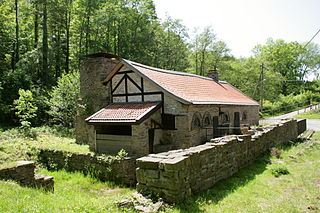
The Deilbachhammer was an iron hammer in Essen-Kupferdreh on the lower reaches of the Deilbach. Today it is used for illustrative purposes and scientific research and is considered the last hammer mill in the Ruhr area that is still at its original location. The preservation of the monument is not guaranteed.
62. Grabmal Brünglinghaus
The Old Huttrop Cemetery was established in 1878 as a municipal community cemetery in today's Huttrop district of Essen. At that time, Huttrop was part of the mayor's office of Stoppenberg, whereby Huttrop was incorporated into the city of Essen in 1908. Deconsecrated in 1991, the burial site has been turned into a park in which several tombs have been preserved, most of which are now listed as historical monuments.
63. Zionskirche
The Zionskirche is a Protestant church in the Horst district of Essen at Dahlhauser Straße 161. It was built from 1957 to 1958 in the style of post-war modernism and today belongs to the parish of Freisenbruch-Horst-Eiberg in the Essen church district of the Evangelical Church in the Rhineland. On 21 November 2019, it was placed under monument protection.
64. Alte Kirche
The Old Church is a Protestant church building in the Altenessen district of Essen, Germany. It was built between 1887 and 1890 and today belongs to the Protestant parish of Altenessen-Karnap in the Essen church district of the Evangelical Church in the Rhineland.
Wikipedia: Alte Kirche (Essen-Altenessen) (DE), Website, Heritage Website
65. Lutherhaus
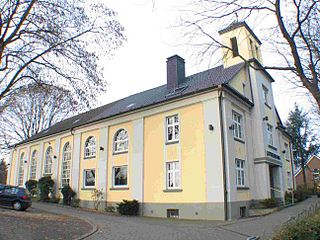
The Luther House in the Essen district of Bedingrade is the central meeting house of the Protestant parish of Essen Bedingrade-Schönebeck in the church district of Essen of the Evangelical Church in the Rhineland.
66. Pestalozzidorf Im Grund
The Pestalozzi Village "Im Grund" is a housing estate for young people, which was built according to the principles of the pedagogue Johann Heinrich Pestalozzi - adapted to the needs of mining - in the Essen district of Katernberg. It is located between the Zollverein III colony and the Dortmannhof.
67. Domschatzkammer
The Essen Cathedral Treasury is one of the most significant collections of religious artworks in Germany. A great number of items of treasure are accessible to the public in the treasury chamber of Essen Minster. The cathedral chapter manages the treasury chamber, not as a museum as in some places, but as the place in which liturgical implements and objects are kept, which continued to be used to this day in the service of God, so far as their conservation requirements allow.
68. Markuskirche
St. Mark's Church is a Protestant church building in the Essen district of Frohnhausen. It is a church of the Evangelical parish of Essen-Frohnhausen, which belongs to the church district of Essen and thus to the Regional Church of the Evangelical Church in the Rhineland.
69. Burgruine Vittinghoff
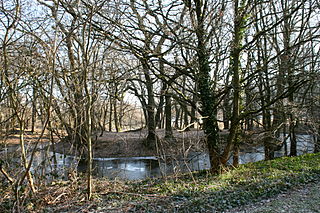
Haus Vittinghoff is a defunct moth on Vittinghoffstraße in the Essen district of Stadtwald. It is the ancestral seat of the noble Vietinghoff family, which in its Westphalian line bore the title Freiherr von Vittinghoff called Schell zu Schellenberg, but in the Baltic line calls itself Freiherr von Vietinghoff-Scheel.
70. Reiterdenkmal, Kaiser Wilhelm I.
The Kaiser Wilhelm Monument on Burgplatz in the centre of Essen is an equestrian statue depicting Kaiser Wilhelm I. As one of numerous Kaiser Wilhelm monuments erected during the German Empire, this one also glorifies Wilhelm I as its founder and as the victor over the Second Empire (France).
71. Evangelische Kirche Katernberg
The Evangelical Church of Katernberg is a church building in the northern district of Katernberg, Essen, Germany. The largest Protestant church in Essen, which belongs to the Protestant parish of Katernberg in the Essen church district of the Evangelical Church in the Rhineland, is a listed building.
72. Ehemaliges Press- und Hammerwerk Ost
The press and hammer mill east was part of the Krupp cast steel factory. Since 1992, the now redesigned, listed factory hall in the western quarter of the city of Essen has served as a multi-storey car park for a furniture store.
73. Christuskirche Kupferdreh
The Christuskirche in Kupferdreh is a Protestant church in the Kupferdreh district of Essen, Germany. It was built in 1877–1879 and 1893–1894 in brick masonry and has been a listed building since 1989. It belongs to the Evangelical parish of Kupferdreh in the Essen church district of the Evangelical Church in the Rhineland.
74. St. Kamillus
The church of St. Camillus, built by Camillians, was built between 1900 and 1901 and is located in the Essen district of Heidhausen. It is directly adjacent to the Kamillushaus, an addiction clinic. Originally a monastery church, it served as the parish church of the independent parish of St. Kamillus until 2008 and has since been the parish church of the provost parish of St. Ludgerus in Werden.
75. Friedenskirche Dellwig
Die Friedenskirche ist eine evangelische Kirche im Essener Stadtteil Dellwig. Sie wurde von 1914 bis 1915 erbaut und gehört zur Kirchengemeinde Dellwig-Frintrop-Gerschede im Kirchenkreis Essen der Evangelischen Kirche im Rheinland.
76. Energie
The sculpture Energie by Günter Steinmann was commissioned in 2007 and re-erected in the Essen district of Rüttenscheid a little to the south after the new east entrance of Messe Essen was built in 2016.
77. St. Johann Baptist (Essen)
The Catholic parish church of St. Johann Baptist is a Gothic hall church in Essen, dedicated to John the Baptist, which stands on Kettwiger Straße, the main street of Essen, in front of Essen Minster, to which it is connected. On account of its position and the fact that its spire towers over the Minster, visitors often mistake it for part of the Minster.
78. Ruhr Museum
The Ruhr Museum, formerly the Ruhrland Museum, is a diverse natural history and cultural history museum for the Ruhrgebiet in Essen, Germany. The sponsor is the Stiftung Ruhr Museum. Director since 2012 is the historian Heinrich Theodor Grütter.
79. Siedlung Mathias-Stinnes
The Mathias-Stinnes-Siedlung in Essen-Karnap, located around Hattramstraße, makes up almost a third of the district. It was built between 1890 and 1910 for the miners of the Mathias Stinnes colliery, which was founded in 1872 and closed in 1972, most of whom came from East Prussia and West Prussia. The first phase of construction included 26 three-family houses for workers and 8 two-family houses for civil servants. The second construction phase, carried out from 1898 to 1910, included a further 70 houses. The order of priority of the employees can be seen in the houses. The settlement has been a listed building since 2005.
80. Geusenengel
Geusenengel or Geusen-Daniel are the name given to the trombone angels in the diaspora of the former Duchy of Jülich on the Lower Rhine. Trombone angels on the roof turrets and towers of Protestant houses of worship in this area serve as weather vanes. The often hidden small churches also served as places of worship for the Geuze who fled from the Netherlands and joined the Protestants working in secret. Their name was then transferred to the Jülich Protestants. The Geusendaniel was probably a fad at the time when these churches were first allowed to attach a bell turret or church tower on or to their churches and houses of prayer. Especially after the Second World War, the Geuse angel became the symbol of the Protestant Christians in the Lower Rhine region. Examples can be found in Goch, in Geldern (Heilig-Geist-Kirche) or in the Marktkirche Kettwig.
81. Altlutherische Kirche
The Evangelical Lutheran Church, also known as the Old Lutheran Church, is a church building built in 1909/10 in Essen, Moltkeplatz 17/19. It belongs to the Westphalian church district of the Independent Evangelical Lutheran Church (SELK).
Wikipedia: Evangelisch-Lutherische Kirche (Essen) (DE), Website
82. Saalbau/Philharmonie
The Saalbau is a concert hall in Essen's southern district and is now the headquarters of the Essen Philharmonic Orchestra with adjoining catering and event areas. The building is centrally located in the city centre on the edge of the Stadtgarten and close to the Aalto Theatre. Tomáš Netopil was General Music Director of the Essen Philharmonic from the 2013/2014 season to 2022/2023, succeeding Stefan Soltész. Andrea Sanguineti took over the role of GMD in his place. Hein Mulders succeeded Johannes Bultmann as artistic director at the beginning of the 2013/14 season. Since the 2023/2024 season, Marie-Babette Nierenz has been artistic director of the Philharmonie.
Wikipedia: Philharmonie Essen (DE), Website, Hearing_impaired Website
Share
Disclaimer Please be aware of your surroundings and do not enter private property. We are not liable for any damages that occur during the tours.
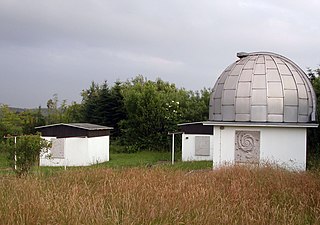
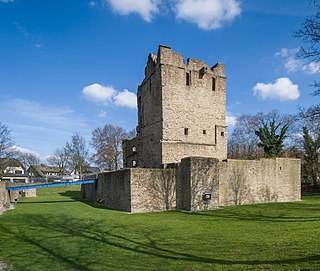
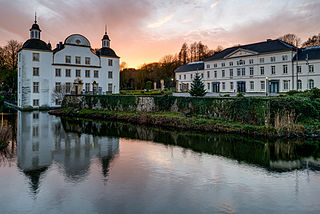
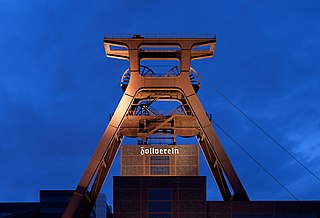
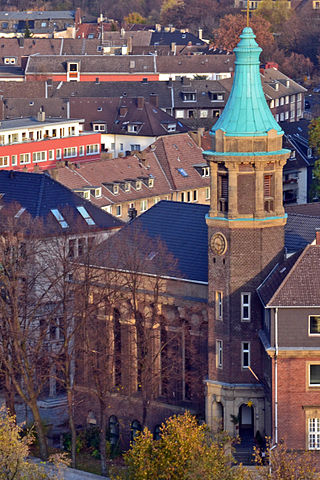
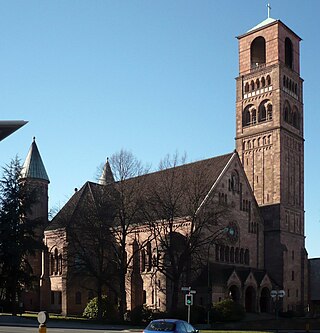
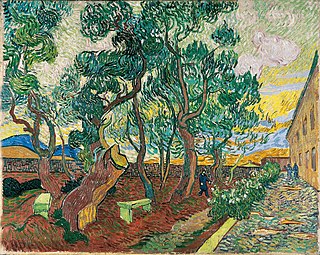
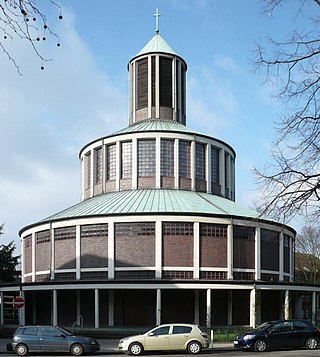
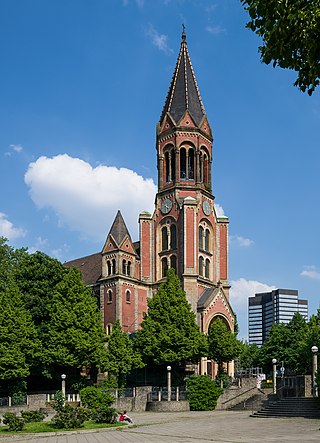
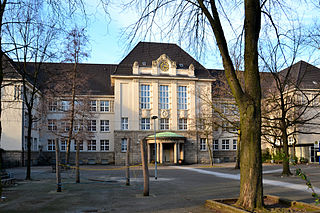
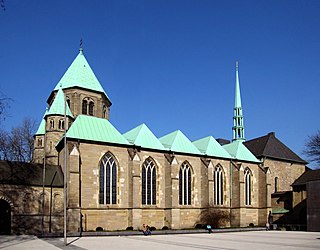
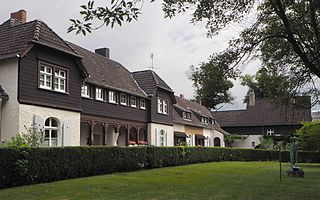
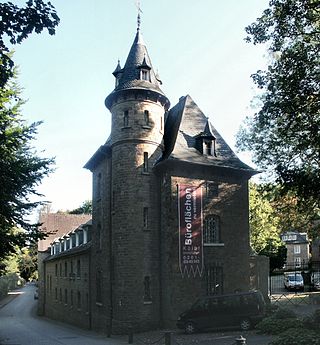
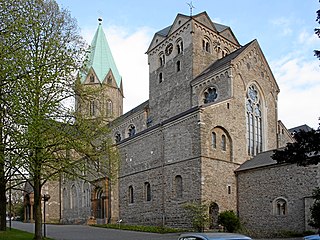
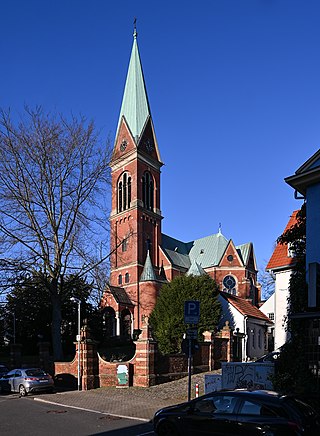
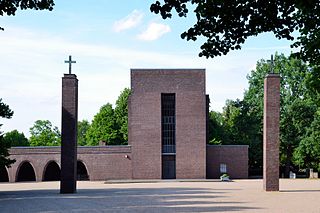
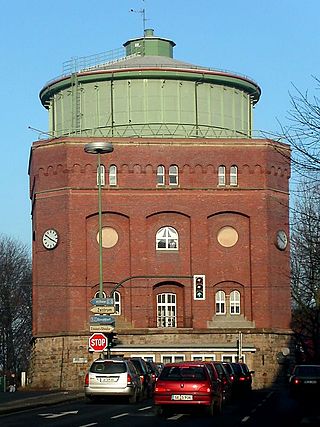
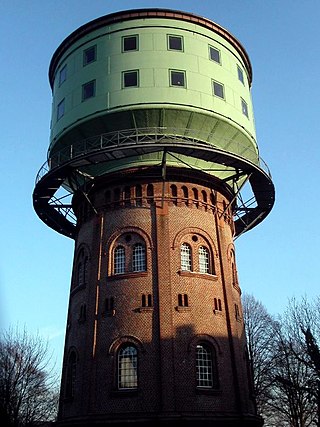
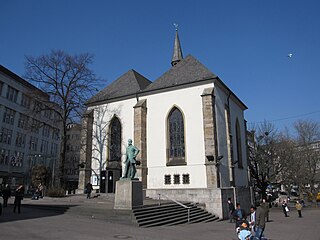
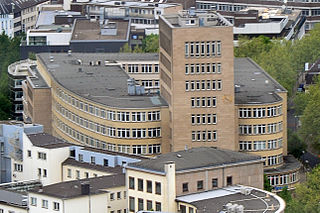
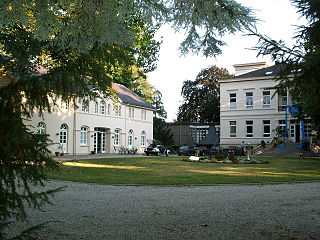
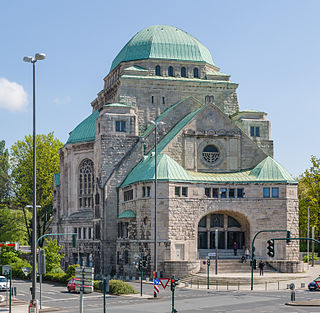
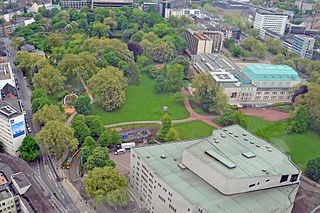
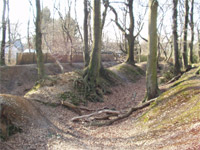
.jpg)
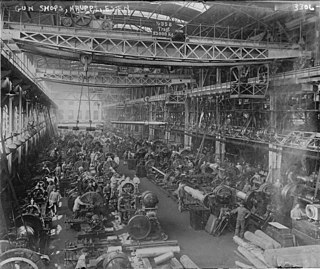
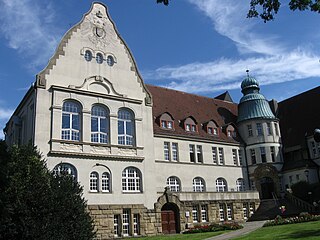
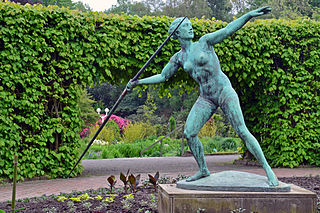
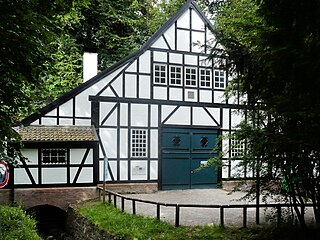
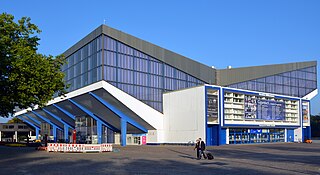
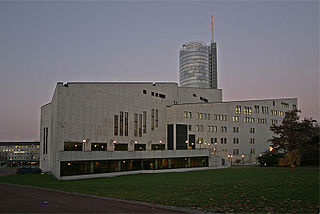
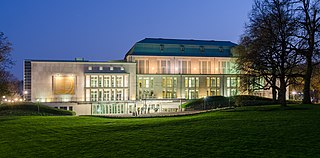
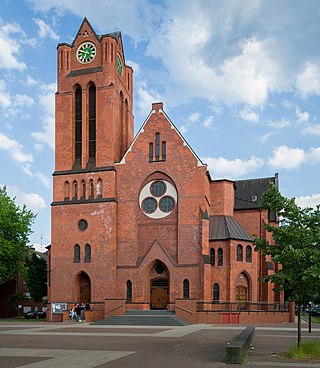
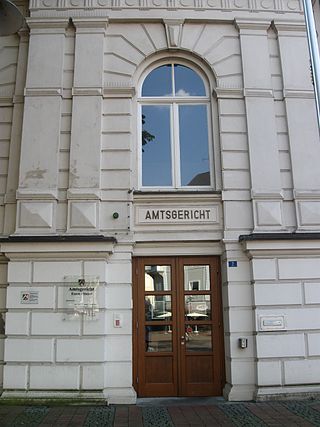
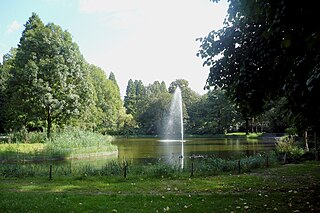
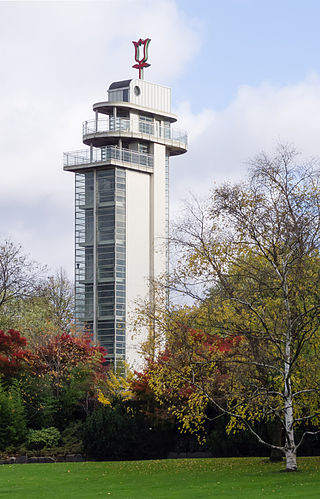
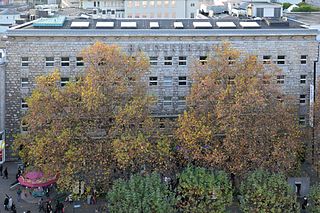
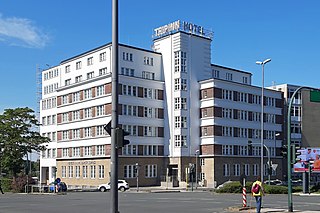
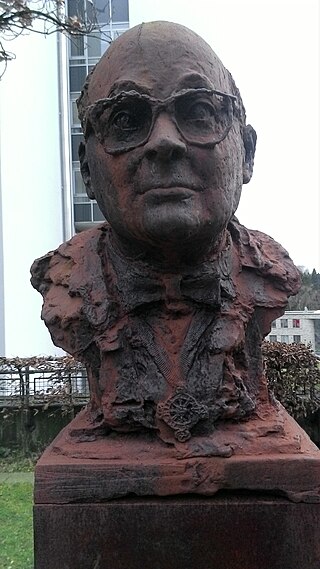
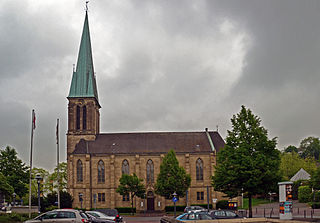
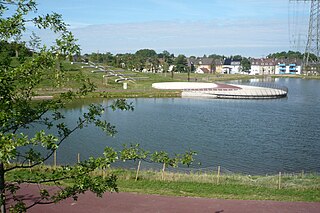
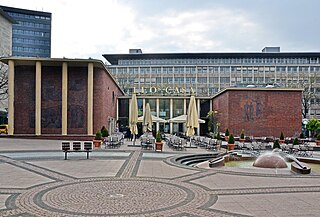
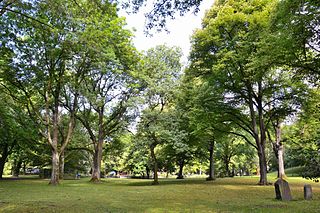
.jpg)
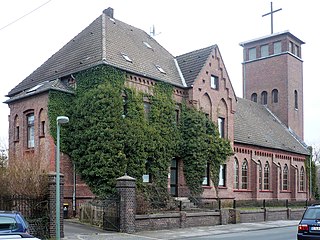
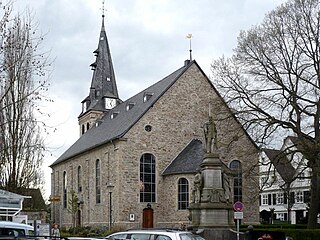
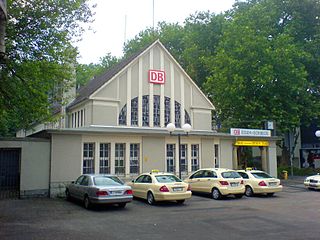
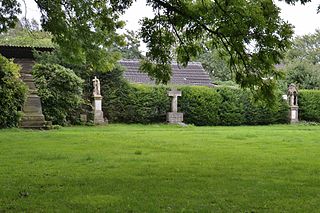
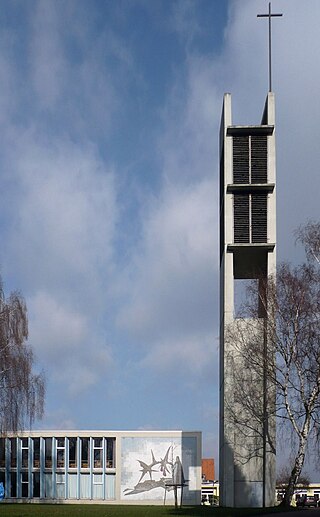
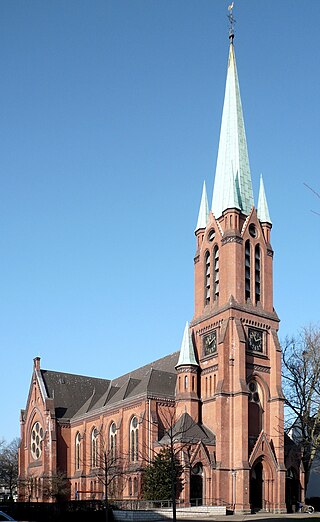
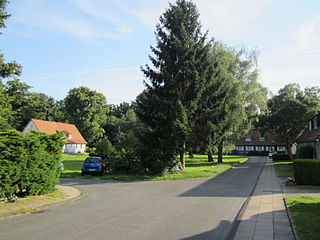
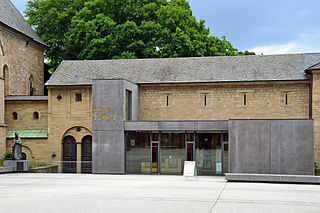
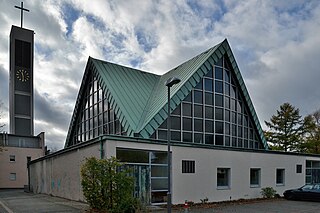
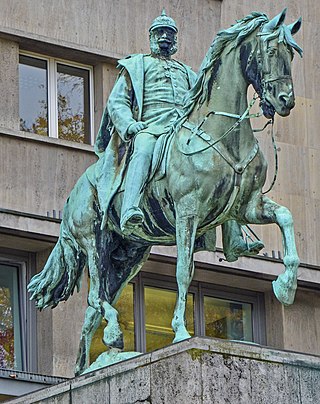
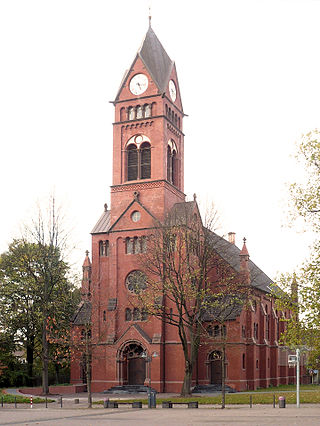
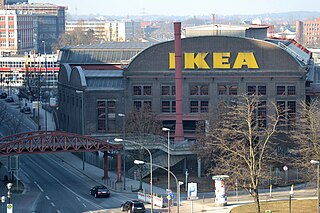
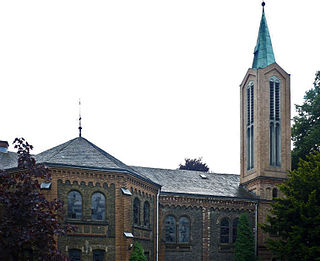
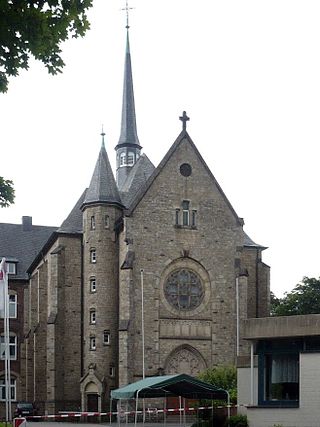
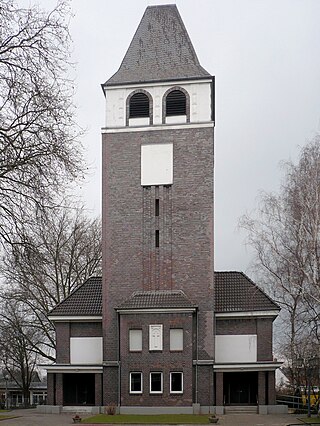
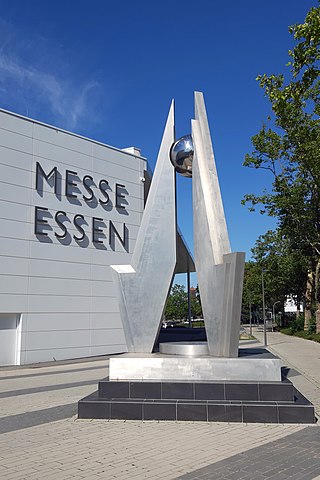
.jpg)
